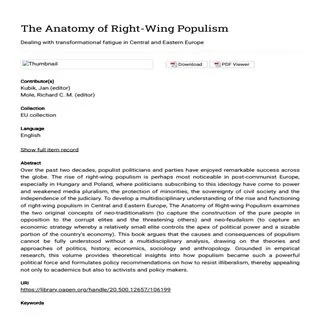Edited by Jan Kubik, Richard C. M. Mole
Over the past two decades, populist politicians and parties have enjoyed remarkable success across the globe. The rise of right-wing populism is perhaps most noticeable in post-communist Europe, especially in Hungary and Poland, where politicians subscribing to this ideology have come to power and weakened media pluralism, the protection of minorities, the sovereignty of civil society and the independence of the judiciary. To develop a multidisciplinary understanding of the rise and functioning of right-wing populism in Central and Eastern Europe, The Anatomy of Right-wing Populism examines the two original concepts of neo-traditionalism (to capture the construction of the pure people in opposition to the corrupt elites and the threatening others) and neo-feudalism (to capture an economic strategy whereby a relatively small elite controls the apex of political power and a sizable portion of the country’s economy). This book argues that the causes and consequences of populism cannot be fully understood without a multidisciplinary analysis, drawing on the theories and approaches of politics, history, economics, sociology and anthropology. Grounded in empirical research, this volume provides theoretical insights into how populism became such a powerful political force and formulates policy recommendations on how to resist illiberalism, thereby appealing not only to academics but also to activists and policy makers.
London: UCL Press, 2025.








